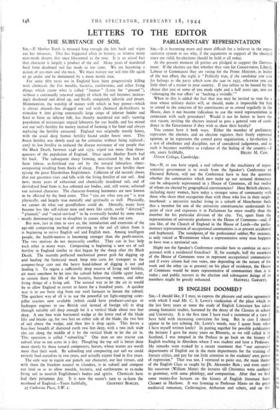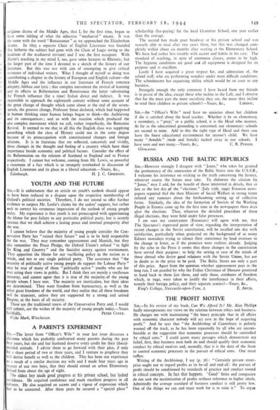IS ENGLISH DOOMED?
Sut,—I should like, if I may, to express the pleasure and entire agreement with which I read Mr. C. S. Lewis's vindication of the place which in the last forty years or more the study of English Literature has taken among humanist studies, hastened by the decay of the Classics in school and University. It is the first time I have read a statement of a view I have held with increasing conviction for long. But in case I should appear to be just echoing Mr. Lewis's words, may I quote from what I have myself written lately? In putting together for possible publication the lectures I gave for many years on Rhetoric, as we still called it in Scotland, I was tempted in the Preface to go back on the history of English teaching in Aberdeen where I was student and later a Professor. My remarks were evoked by a recent statement that "our university departments of English are in the main departments for the training of literary critics, and pay far too little attention to the students' own power of expression." That was not, I ventured to point out, the main theme of the English Class as taught by Dr. Alexander Bain ; and even under his successor (William Minto) the lectures till Christmas were confined to grammar, with some philology, and composition. After that we had some twenty-five lectures on the history of English literature front Chaucer to Marlowe. It was listening to Professor Minto on the great mediaeval romances, Carlovingian, Arthurian and others, and on the roigious drama of the Middle Ages, that I, for the first time, began to have some inkling of what the adjective " mediaeval " meant. It was the same with the word "Renaissance" as we approached the Elizabethan drama. In 1893 a separate Chair of English Literature was founded (for hitherto the subject had gone with the Chair of Logic owing to the tradition of the n:ediaeval trivium) and I was the first occupant. With Minto's teaching in my mind I, too, gave some lectures to Rhetoric, but the larger part of the time I devoted to a sketch of the history of our literature. But this was not with aim of attempting to give critical estimates of individual writers. What I thought of myself as doing -was contributing a chapter to the history of European and English culture—the Middle Ages and the influence in our literature of French romance allegory, fabliau and lyric ; that complex movement the revival of learning and its effects in Reformation and Renaissance the latter substituting for French influence (for a time) Italian direct and indirect. It was impossible to approach the eighteenth century without some account of the great change of thought which came about at the end of the seven- teenth, the greatest change, Professor Stout declared, which had happened in human thinking since human beings began to think—the Aufkliirung and its consequences ; and so with the reaction which produced the also complex movement which we call, rather imperfectly, the Romantic Revival. It seemed to me that in all this the English class was supplying something which the class of History could not in the same degree because of its preoccupation with constitutional changes and foreign relations. It is in literature that are reflected, concretely and vividly, those changes in the thought and feeling of a country which have their importance beside economic and political factors. Consider the effect of the Reformation on the relation of Scotland to England and to France respectively. I cannot but welcome, coming from Mr. Lewis, so powerful a statement of a fact which is so strangely overlooked in discussion of English Literature and its place in a liberal education.—Yours, &c.,



























 Previous page
Previous page